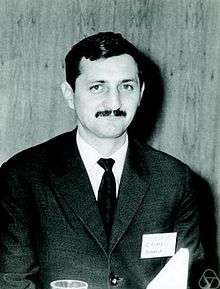Ciprian Foias
Ciprian Ilie Foiaș (20 July 1933 – 22 March 2020) was a Romanian-American mathematician. He was awarded the Norbert Wiener Prize in Applied Mathematics in 1995, for his contributions in operator theory.
Ciprian Foias | |
|---|---|
 Ciprian Foias in Tokyo 1969 | |
| Born | Ciprian Ilie Foiaș 20 July 1933 |
| Died | 22 March 2020 (aged 86) |
| Nationality | Romania |
| Alma mater | University of Bucharest |
| Awards | Wiener Prize (1995) |
| Scientific career | |
| Fields | Mathematics |
| Institutions | Indiana University University of Bucharest |
| Doctoral advisor | Miron Nicolescu |
| Doctoral students | Zoia Ceaușescu Adrian Ocneanu Dan-Virgil Voiculescu |
Education and career
Born in Reșița, Romania, Foias received his doctorate from the University of Bucharest in 1962, under supervision of Miron Nicolescu. He taught at his alma mater (1966–1979), Paris-Sud 11 University (1979–1983), and Indiana University (1983 until retirement). Beginning in 2000, he was a teacher and researcher at Texas A&M University, where he was a Distinguished Professor.
The Foias constant is named after him. Foias is listed as an ISI highly cited researcher.[1]
Together with Sz-Nagy, Foias proved the celebrated Commutant lifting theorem.
He died in Tempe, Arizona on March 22, 2020.[2]
Publications
- with Béla Szőkefalvi-Nagy: Harmonic analysis of operators on Hilbert Space. North Holland 1970 (Translated from the French; first edition: Masson 1967). MR0275190
- with Roger Temam, Oscar Manley, and Ricardo Rosa: Navier Stokes equations and Turbulence. Cambridge University Press, 2001.
- with Peter Constantin, Roger Temam: Attractors representing turbulent flows. American Mathematical Society, 1985.
- with Peter Constantin: Navier Stokes Equations. University of Chicago Press, 1988.
- with Hitay Özbay, Allen Tannenbaum: Robust control of infinite dimensional systems. Springer, 1995.
- with Hari Bercovici, Carl Pearcy: Dual algebras with applications to invariant subspaces and dilation theory. American Mathematical Society, 1985.
- with Ion Colojoară: Theory of generalized spectral operators. Gordon and Breach, 1968.
- with Peter Constantin, Roger Temam, and Basil Nicolaenko: Integral Manifolds and Inertial Manifolds for Dissipative Partial Differential Equations. Springer-Verlag, Applied Mathematical Sciences Series, volume 70, 1988.
See also
- Attractor
- Evolution equation
References
- "List of ISI highly cited researchers".
- "Obituary for Ciprian Foias". Retrieved March 23, 2020.